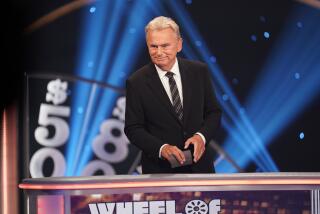What I learned from ‘The Price Is Right’
- Share via
EARLY IN 1998, I flew to Las Vegas to watch the Super Bowl at the Stardust for Esquire magazine. We had a swanky room, plenty of cool free passes and carte blanche in the sports book. But the instant the game ended, my wife and I sped across the desert to Los Angeles with only one goal in mind: to get to a taping of “The Price is Right.” I wanted to see Plinko up close. I wanted to touch the wheel that contestants spin to advance to the Showcase Showdown. Most of all, I wanted to shake the hand of the vegetarian, karate-kicking television host from the Rosebud Reservation in South Dakota.
Bob Barker, who is taping his final “Price” episode today for broadcast June 15 on CBS, was one of my childhood idols. He was impeccably tailored, and he genuinely engaged the contestants, even when the outrageously T-shirted hoi polloi didn’t match the effortless grace of the host.
More important, watching “The Price Is Right” taught me an enormous amount about money.
Naturally, I loved the showcases, the cars and “Barker’s Beauties.” But what kept me coming back was the daily lesson in the principles of behavioral finance. If you wanted to know how to exploit -- or get trapped by -- market inefficiencies and the often irrational behavior of competitors, “The Price Is Right” was essential.
When a member of “contestants’ row” would guess $890 after a contestant had guessed $900, I’d yell at the TV, “How can you leave yourself a window of just 10 bucks?” I cringed when contestants would spin the wheel and inexplicably stick on 50 cents. I noticed how the guesses of some would influence the behavior of others; if a couple of “One Dollar!” bids won in early rounds, contestants in later rounds would play defense, with generally lower guesses.
Today, dozens of websites offer game theory suitable to the ever-evolving mix of estimation exercises on “The Price Is Right.” I’d calculate that the amount of solid financial education going on at these sites is fairly low -- someone who needs a website to assemble game-show strategy probably isn’t the “studying websites for mathematical advice” type -- but just by making that estimate, I’m drawing on analytic skills I developed watching Barker’s TV show.
There’s a concept in education called “authentic assessment,” which refers to the idea that information is more compelling when it relates to the real world. Barker’s show combined real prices with ludicrous kitsch. (CBS has yet to announce who will fill the great man’s shoes and how the show will change.) That’s the case with the show’s “Cliffhangers” segment, which since 1976 has paired estimating the prices of everyday items with yodeling. Another game, Hi/Lo, has been said to have odds of 57-1 against a contestant.
When I visited “Price” to see the show live, the host proudly showed me the sets and shared with me the large role he played in developing games, detailing the precarious balance of chance, understandability, visual appeal and novelty that added up to a classic game. He gave me my yellow price-tag name badge, and he and I chatted in his dressing room as he awaited his makeup.
I doubt that many “Price” contestants or viewers at home give much thought to Pierre de Fermat or Blaise Pascal, brilliant mathematicians from centuries past who helped create probability theory. But Barker, with his odd, hand-held stick microphone and trademark plea to spay and neuter pets, brought their concepts into millions of homes for 35 years.
Like most good teachers, he made the lesson as painless as possible. Here was this exceptionally bright man, who knew exactly how silly the games could seem and how goofy some of the contestants were. Yet Barker remained ever respectful, never playing for an easy laugh at a contestant’s expense, never unsheathing either sarcasm or disbelief at even an egregiously idiotic guess.
Bob Barker’s show taught me a lot about finance. Bob Barker taught me a lot about how a man should act.
More to Read
Inside the business of entertainment
The Wide Shot brings you news, analysis and insights on everything from streaming wars to production — and what it all means for the future.
You may occasionally receive promotional content from the Los Angeles Times.










